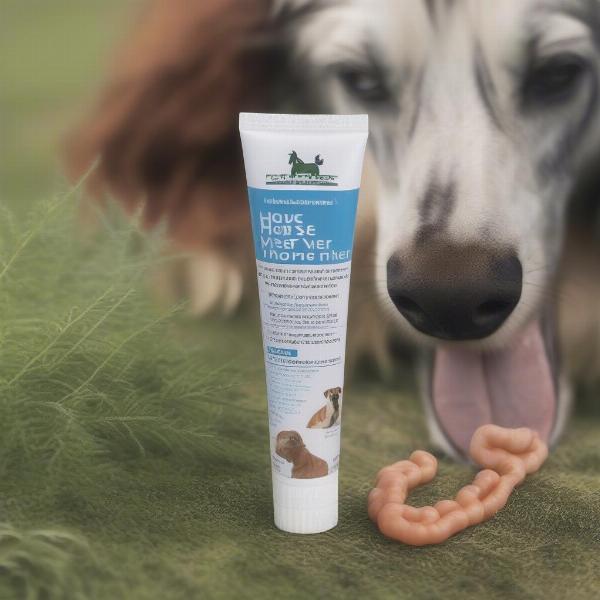Using horse paste wormer for dogs is a dangerous practice and should be avoided. While some people believe it’s a cost-effective alternative to dog-specific dewormers, the differences in formulation and dosage can lead to serious health risks for your canine companion. The concentration of active ingredients in horse paste wormers is significantly higher than in products formulated for dogs. Even a small miscalculation can result in an overdose, causing symptoms ranging from mild gastrointestinal upset to severe neurological damage and even death. Instead of risking your dog’s health, consult with your veterinarian for the correct diagnosis and treatment of intestinal parasites. They can recommend a safe and effective dewormer specifically designed for your dog’s size, breed, and health status.
Why Horse Paste Wormer for Dogs is Dangerous
The seemingly straightforward nature of horse paste wormer, coupled with online discussions, can mislead some dog owners into thinking it’s a safe and economical option. However, this is a misconception that can have dire consequences. The primary reason for the danger lies in the difference in dosage. Horses are significantly larger than dogs, and their wormers reflect this. Giving even a small amount of horse paste to a dog can result in a significant overdose. Furthermore, the specific active ingredients and their concentrations can vary significantly between horse and dog wormers. What might be safe for a horse could be toxic to a dog.
 Horse Paste Wormer Danger for Dogs
Horse Paste Wormer Danger for Dogs
The Risks of Incorrect Dosage
The consequences of miscalculating the dosage of horse paste wormer can be severe. Mild overdoses can cause vomiting, diarrhea, and loss of appetite. More severe overdoses can lead to neurological symptoms such as tremors, seizures, blindness, and even paralysis. In extreme cases, an overdose can be fatal. The risk is even greater for small dogs, puppies, and senior dogs, who are more sensitive to medications.
Safe Deworming Practices for Dogs
Protecting your dog from intestinal parasites requires a responsible approach. Regular veterinary checkups are crucial for early detection and appropriate treatment. Your veterinarian can perform fecal tests to identify the specific type of parasite present, if any, and prescribe the most effective dewormer. This tailored approach ensures that your dog receives the correct medication at the correct dosage, minimizing the risk of adverse effects.
Alternatives to Horse Paste Wormer
Several safe and effective deworming medications are specifically formulated for dogs. These products are available in various forms, including tablets, chewables, and liquids. Your veterinarian can recommend the most appropriate product and dosage based on your dog’s individual needs. Never attempt to self-treat your dog for worms, as this can lead to misdiagnosis and potentially harmful consequences.
What to Do If You Suspect Your Dog Has Worms
If you suspect your dog has worms, the first step is to contact your veterinarian. They will be able to diagnose the type of worm and recommend the appropriate treatment. Never attempt to use horse paste wormer or any other medication not specifically prescribed for your dog. Prompt veterinary care is essential for ensuring your dog’s health and well-being.
Conclusion
While cost-saving measures are understandable, risking your dog’s health by using horse paste wormer is never justified. Always consult with your veterinarian for safe and effective deworming solutions tailored to your dog’s specific needs. The potential consequences of using horse paste wormer far outweigh any perceived benefits.
FAQ
- Why is horse paste wormer dangerous for dogs? The concentration of active ingredients is much higher in horse paste, making it easy to overdose a dog.
- What are the signs of worming overdose in dogs? Symptoms can range from vomiting and diarrhea to neurological issues like tremors and seizures.
- What should I do if I think my dog has worms? Contact your veterinarian immediately for diagnosis and treatment.
- Are there safe alternatives to horse paste for deworming dogs? Yes, there are many dog-specific dewormers available through your veterinarian.
- Can I deworm my dog myself? No, always consult a veterinarian for proper diagnosis and treatment.
- How often should I deworm my dog? Your veterinarian can recommend a deworming schedule based on your dog’s lifestyle and risk factors.
- Are all horse wormers toxic to dogs? Yes, due to the difference in dosage and formulation.
ILM Dog is your trusted global resource for expert dog care and breed information. We offer practical advice on all aspects of dog ownership, from puppy care to senior dog health, nutrition, training, grooming, and even traveling with your furry friend. For expert guidance on choosing the right breed for you or addressing specific health concerns, explore our in-depth articles and resources. ILM Dog helps you navigate the joys and responsibilities of dog ownership with confidence. Contact us at [email protected] or +44 20-3965-8624. Visit ILM Dog for more information.